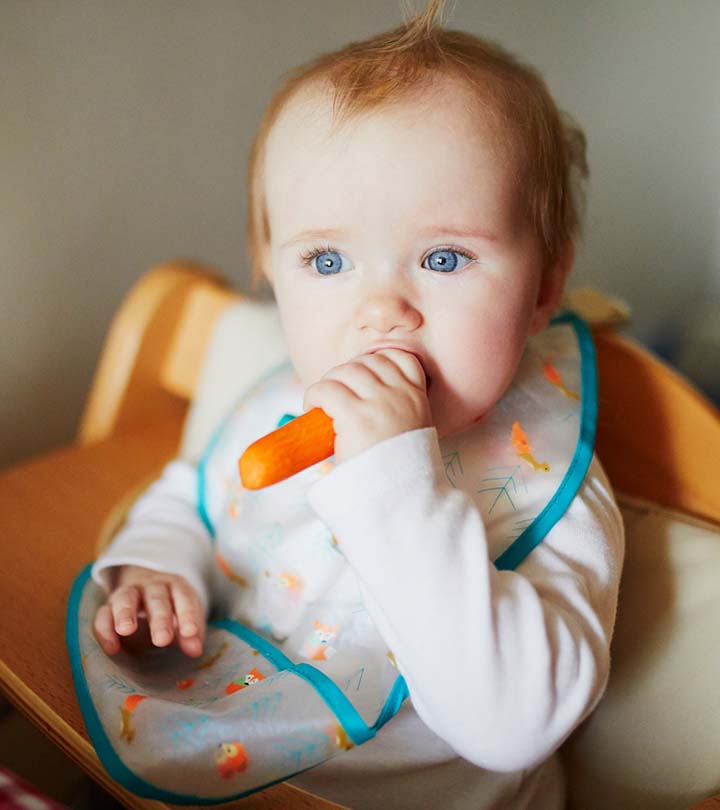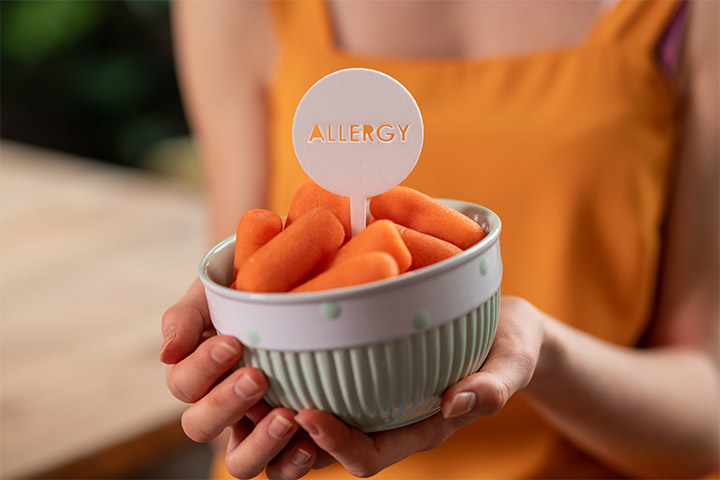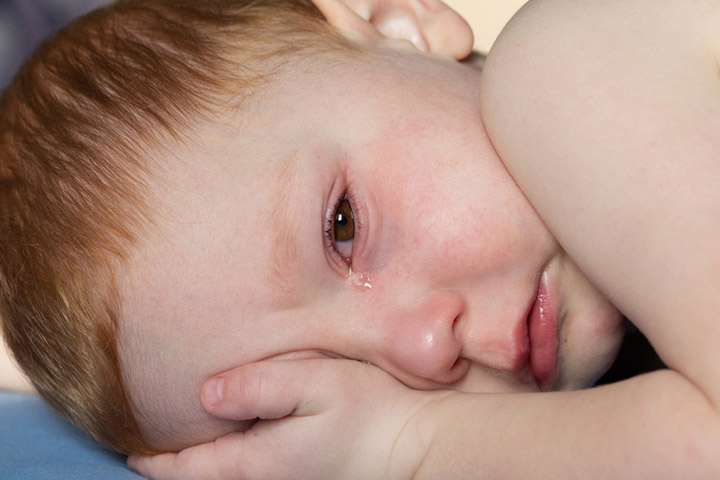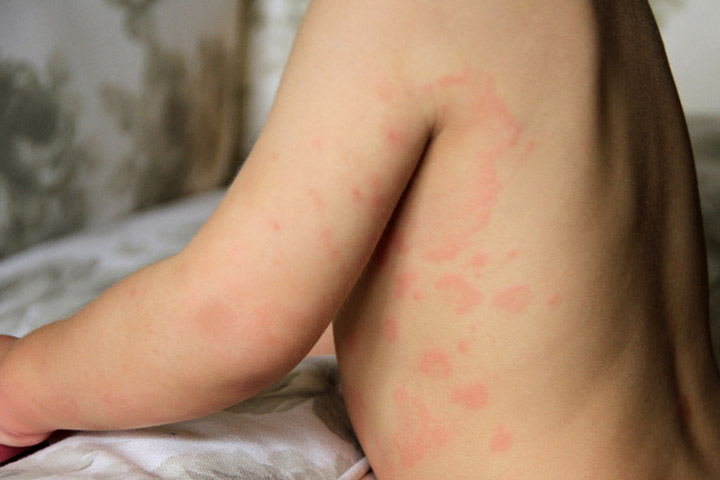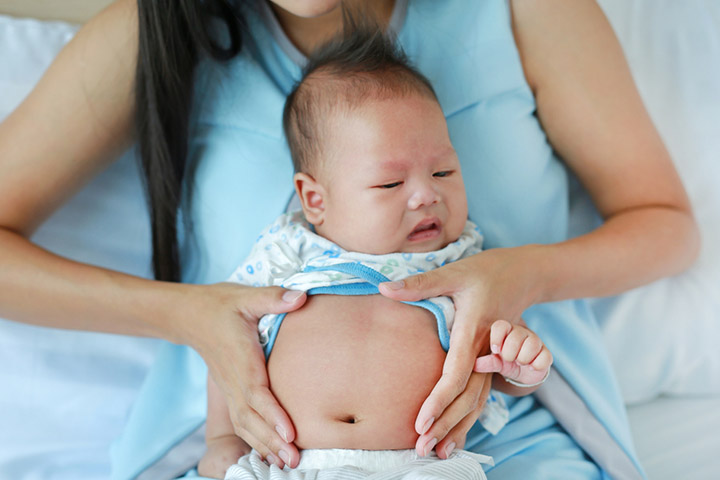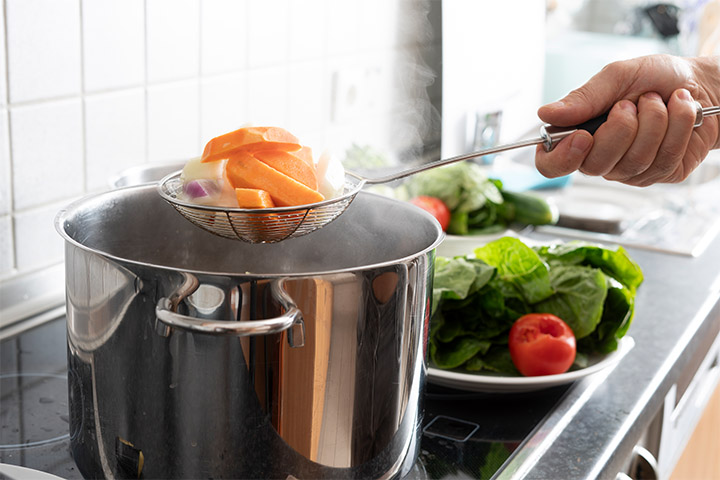The common allergens that cause food allergies include peanuts, dairy, and eggs, to name a few. However, sometimes parents also deal with carrot allergy in infants. In most cases, children develop carrot allergies if their parents are allergic to carrots. The allergy may manifest in red, watery eyes, hives, and swollen lips as the common symptoms. These allergies are mostly treated with antihistamines or some home remedies. Although children may get over the allergy as they grow, it is best to avoid the vegetable as long as they are allergic. This post tells you all about carrot allergy, the symptoms associated with it, and ways to treat it.
How Common Is Carrot Allergy?
The most common food allergens are soy, dairy, eggs, peanuts, shellfish, and tree nuts. So, carrot allergy is relatively rare. But it does happen. According to the US Centers for Disease Control and Prevention (CDC), nearly one-quarter of children in the US have been diagnosed with at least one allergic condition. One of the major causes of allergies is genetic (1). So if you or your partner has a carrot allergy, chances are high that your baby too will develop it.
If your baby develops an allergy to carrot, she will also react badly to parsley, coriander, parsnip, celery, fennel, dill, and anise – or in other words, the entire carrot family. Another interesting fact about carrot allergy is that if your child gets it, she has a higher risk of developing pollen allergy too. The reverse is also true (2). So, it is best to wait till your baby is seven months old before adding carrots to her diet.
Symptoms Of Carrot Allergy In Infants
Most infants don’t react adversely to a new food the first time they eat it. They show no symptoms even if they are allergic to the food. The body identifies the particular food and creates antibodies. But the second time when the same food is taken, the body identifies it and the immune system will try to fight against them, causing the allergy symptoms. Some allergic reactions to a food such as carrots are hardly noticeable, causing only gas or fussiness. Other symptoms, such as a swollen throat, could be fatal.
1. Watery, itchy, and red eyes
If your baby has a carrot allergy, she may react to it with watery, itchy and red eyes. This is an irritating symptom, but not dangerous.
2. Swollen Lips, Face, And Tongue
You may also notice that your baby has developed a swollen face and lips after consuming carrots. Sometimes, even swelling of the throat may lead to breathing difficulties.
3. Hives
Hives are swollen, pale red bumps, patches, rashes, or welts on the skin that appear suddenly. They can happen because of allergies or other reasons. Most children who are allergic to carrots break out in hives after eating them. Your baby may also feel itchy.
A first-time mother from Canada shares some symptoms her baby experienced after eating carrots for the first time, “When I fed her carrots and played a bit, a little over an hour later, she spit up with bits of carrot in her vomit. Later on, for dinner, I gave her bananas, and while putting her to bed, I noticed her puffy eyes and a rash around her cheeks. I am assuming because carrot is the only new thing that I introduced to her yesterday (i).”
4. Runny nose
Another common carrot allergy symptom is a runny nose. So, if your baby develops a case of sniffles after eating carrots, an allergy may be at work. Very rarely, carrot allergy may present as wheezing or even asthma in more serious cases (3).
5. Gingivitis
Many infants may develop gingivitis or swollen gums after enjoying some carrot puree.
6. Digestive Issues
Babies also develop gastric issues, such as bloating, nausea, stomach pain, vomiting, and diarrhea as a reaction to carrots.
Pediatrician Dr. Bidisha Sarkar says, “Carrots contain sugar and fiber, which can sometimes cause digestive issues in babies. It’s also important to pay attention to how much carrot you give your child. It is ideal to serve carrots in moderation since excessive consumption may cause adverse effects.”
7. Anaphylaxis
This is the most dangerous and thankfully, rare symptom of carrot allergy. In some extreme cases, an infant can go into shock after consuming carrots.
Treating Carrot Allergy In Infants
Most infants outgrow their allergies as their immune systems mature. But if you want to prevent these unpleasant symptoms, the best thing is to keep your little darling away from carrots!
If you are looking for ways to ease your baby’s symptoms, antihistamines will be your best friend. But don’t give your baby any OTC medication. Talk to your doctor before you medicate your infant.
There are some home remedies that can also be used to provide relief from carrot allergy symptoms. For example, you can make some sandalwood paste and apply it on the hives to ease the itching.
More than allergies, carrots are infamous for causing ‘Blue Baby Syndrome’ (4). This syndrome occurs due to the excessive deposition of nitrates in the body. It leads to a temporary change in skin color, mainly around the mouth and nails.
Babies below one year are most at risk of this health issue. It can even lead to serious complications if not treated on time. Blue baby syndrome is commonly caused by drinking nitrate laden water. But sometimes, vegetables like carrots too can contain nitrates. Fortunately, most packaged baby foods contain negligible amounts of it and do not cause any adverse effects (5).
But if you prepare baby food at home, you need to be careful. Fortunately, with a little care, you can minimize the risk of this disorder (6).
Tips For Preparing Your Own Baby Food
Cooking for your baby can be an fulfilling experience. But you need to be careful! Here are some easy tips to ensure that you cook carrots the right way!
- Always wash and peel carrots before using them.
- Chop or mash the carrots just before cooking.
- Blanch the carrots in boiling water.
- Do not store homemade carrot puree. Use it immediately.
- If storage cannot be avoided, freeze it.
Carrot allergy in infants may not be something you often encounter. Do not worry, as carrot allergies can be managed with simple remedies or treatment upon timely diagnosis. However, if your baby does develop an allergic reaction to carrots, it is best to stop including them in their meals and consult a doctor. In order to ensure they receive prompt treatment, you must be mindful of their reaction whenever any new food is introduced to them to monitor their reactions.
Key Pointers
- Although not that common, carrot allergy symptoms might appear in infants with a genetic history of the same.
- The symptoms of this condition usually manifest as fussiness, gas, hives, or digestive issues.
- Therefore, it is advised to avoid giving carrots to babies prone to allergies.
- Preparing your baby’s food at home by adequately washing, blanching, and cooking the carrots can help manage allergy risks.
- However, please consult your child’s pediatrician to ensure that it is safe to include carrots in their diet.
